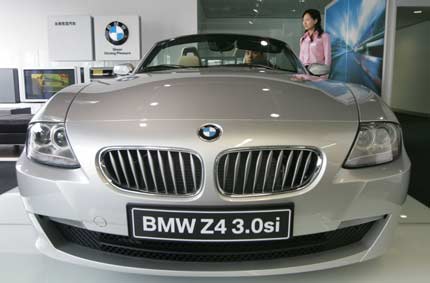BMW races with Audi for gov't list
By Gong Zhengzheng (China Daily)Updated: 2007-03-30 15:17
German luxury carmaker BMW is eyeing the fleet of high-ranking Chinese government officials, a segment dominated by rival Audi for a long time.
 A customer checks out a car at a BMW showroom in Beijing, June 12, 2006. [Reuters]  |
The Munich-based company is in discussions with regulators to put its vehicles on the government's shopping list, said Christoph Stark, president and CEO of BMW Group China.
"The government purchase sector is important for us and we have the confidence to enter it," Stark said.
| |||
In 2003, BMW began assembling its 3 and 5 Series sedans in a joint venture with Brilliance China Auto in the northeastern city of Shenyang. Most of its Chinese customers are private buyers.
"We'll try to explore the possibility of more customers, such as government institutions and State-owned companies," Stark said.
Last November, the venture launched the new 5 Series sedans, which are 14 cms longer than the old ones and only available in China.
The move was seen as part of BMW's efforts to make forays into the government purchase sector.
Foreign and domestic carmakers have been exploring this fast-growing segment for some time now. According to industry data, governments at all levels in China last year spent 70 billion yuan buying vehicles.
Audi, which kicked off its China production in the early 1990s, dominates the fleet of high-ranking government officials with its hot-selling A6 sedans. This has worked to attract the elite and boost its sales.
Audi's sales on the mainland reached 80,808 units last year, up 39 percent from 2005. BMW's mainland sales, on the other hand, surged by 51.3 percent to 36,357 units, including 22,550 locally made 3 and 5 Series sedans.
Mercedes-Benz sold 21,200 cars on the mainland and in Hong Kong last year, an increase of 32 percent. It began assembling its E-Class sedans at the beginning of the year in Beijing.
Alfred Rupp, CEO of BMW's venture with Brilliance, said the venture has lifted its annual production capacity to 41,000 units from 30,000 to meet growing demand. "We can raise capacity further by improving processes," Rupp said.
He said the venture will find 80 first-tier suppliers in China by the end of this year, up from 50 at present. It also plans to increase its procurement of locally made spare parts to 3 billion yuan this year from 2 billion yuan in 2006, he added.
"BMW and Brilliance are satisfied with the venture's performance," said Stark, refuting recent reports that the German carmaker is seeking a second partner in China.
Luxury car sales in China amounted to 160,000 units last year, a little less than 4 percent of the nation's entire passenger car sales, according to Stark.
Analysts predict sales will grow rapidly as the number of rich buyers in China grows by leaps and bounds.
Sales of China-made vehicles climbed 25 percent to 7.22 million units last year, including 4.2 million passenger cars.
(For more biz stories, please visit Industry Updates)
